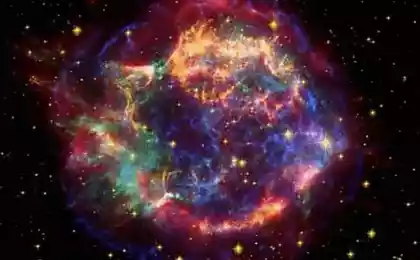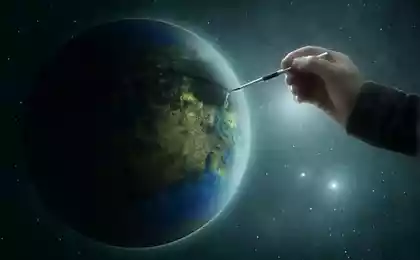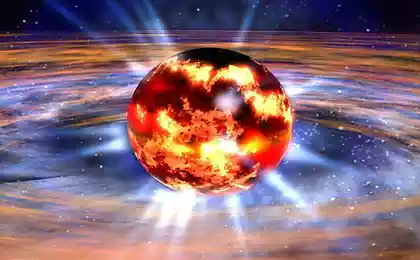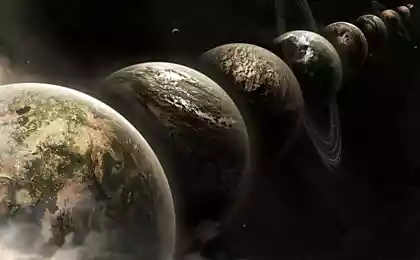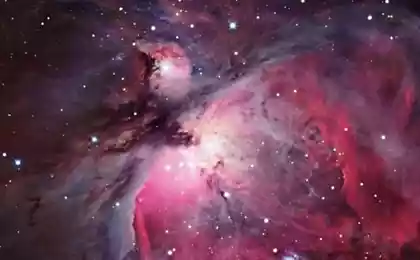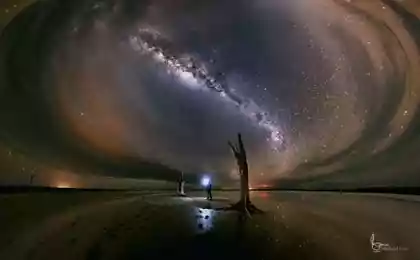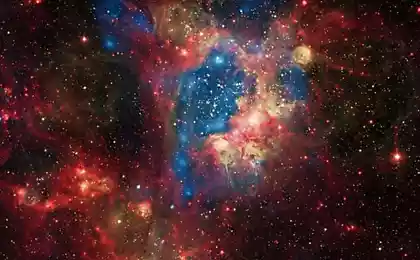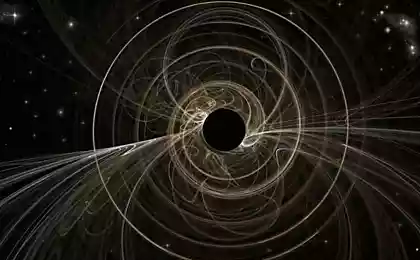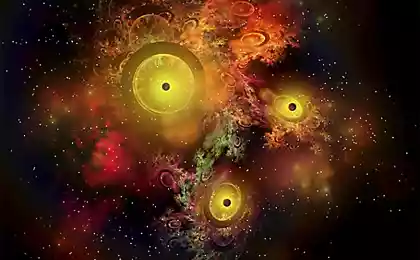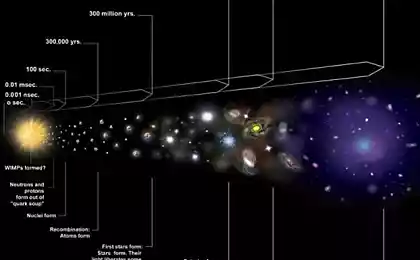900
Are we alone in the Universe
Trying to find an answer to one of the most complex issues in the world.
All people have mixed feelings when a clear night gaze at the starry sky and see it ...
6 photos.
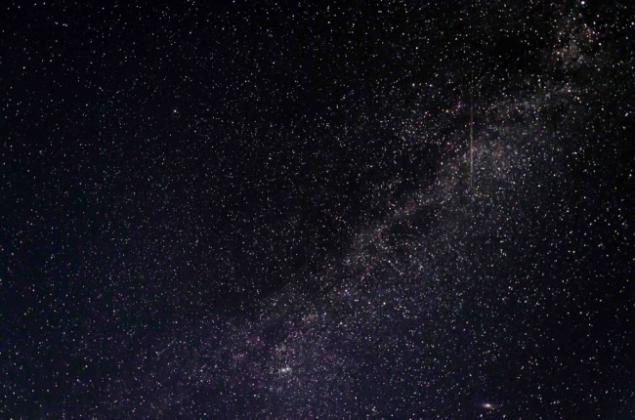
Some traditionally affected epic beauty and grandeur of the cosmos, I personally fall into a state of existential crisis. But the physicist Enrico Fermi wondered, "Where is the rest of intelligent life forms?" The starry sky seems overwhelmingly huge, but in fact we can only consider the immediate vicinity. The best night we can see about 2,500 stars (out of about 100 Millard in our galaxy), and almost all of them are from us at a distance of less than 1,000 light-years before us (about 1% of the diameter of the Milky Way). So we look at it:
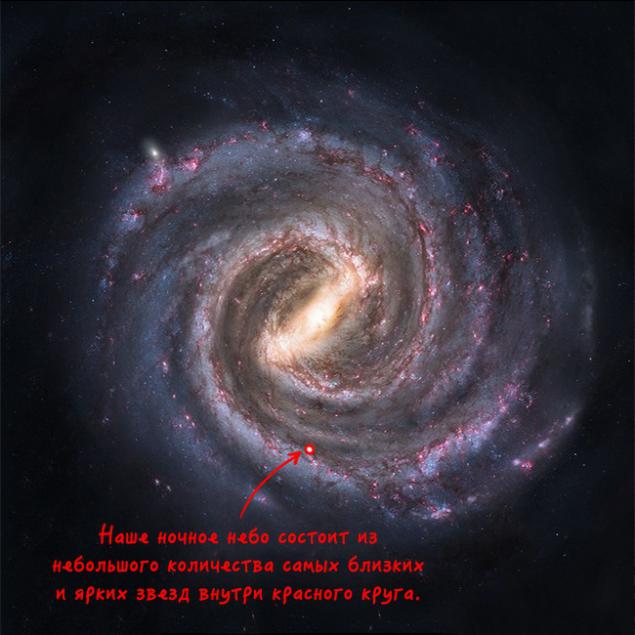
Everything in the universe around 10²² stars, that is, for every grain of sand in the world, there 10,000 stars. And if we perform some simple calculations, you find that only one in our galaxy must be about 100 000 intelligent civilizations. The scientific world is not fully concurs about what percentage among those stars "sunlike" (similar in size, temperature, and the ability to shine) - estimates range from 5% to 20%. The most conservative estimate it gives us 500 trillion (or 500 billion billion) stars similar to the sun. Also argue about what percentage of these sunlike stars may have orbiting planets similar to Earth (with similar temperature conditions, water in the liquid state and the ability to support life). Some say that there are about 50%, but let's stick to more conservative 22%. This means that potentially inhabited planets like ours, only about 1% of all the stars of the universe, that is about 100 trillion planets. That is, for every grain of sand in the world there are about 100 Earth-like planets. Think about this the next time will be selected to the beach. Next, we have to make some assumptions. Let's imagine that in billions of years of its existence on 1% of the terrestrial planets evolved life (if that's true, every grain of sand will be a planet with life on it). And imagine that 1% of these planets have life reached a certain intellectual level - as we do on Earth. That would mean 10 quadrillion, or 10 million billion of intelligent civilizations in the observable universe. Now back to our galaxy alone. We perform the same conservative estimates: 100 billion stars of the Milky Way may be one billion Earth-like planets and 100 000 intelligent civilizations in our galaxy. If this is the case, and at least some of them sends radio waves or laser beams or some other signals for contact with others, they already could detect, for example, the Organization of the search for extraterrestrial intelligence (SETI). But there was no signal. No one. Never. It is even more strange: our Sun is relatively young by the standards of the universe. There are much older stars with a much older Earth-like planets, which in theory is the presence of more advanced civilizations. For example, compare our Earth (4, 5 billion years) and hypothetical planet X (8 billion years old).
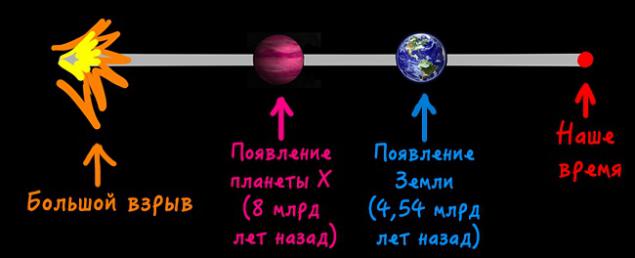
Technology and knowledge are ahead of us for 1000 years, we have been shocked as well as medieval man modern life. Civilization, bypassed us in a million years would have been inconceivable for us as human culture for chimpanzees. But Planet X in front of us at 3, 5 billion years. There is such a thing - the scale Kardashev. It distinguishes civilization I, II, III types depending on their level of development. We have barely before I type. If the higher forms of existence, they do not notice it would be very difficult.
Where is everybody?
Welcome to the Fermi Paradox. All the hypothetical solution of this paradox can be divided into 2 groups: 1. There is no sign of higher civilization, because of higher civilizations do not exist for this group of scientists likely cause of the lack of other life forms is the so-called "Great Filter". The theory of the Great Filter says that at some point in their lives, anticipating the Civilization III type of life is faced with a kind of "wall" that hinders the evolutionary process or even cease to exist. It was she who is the greatest Filter.
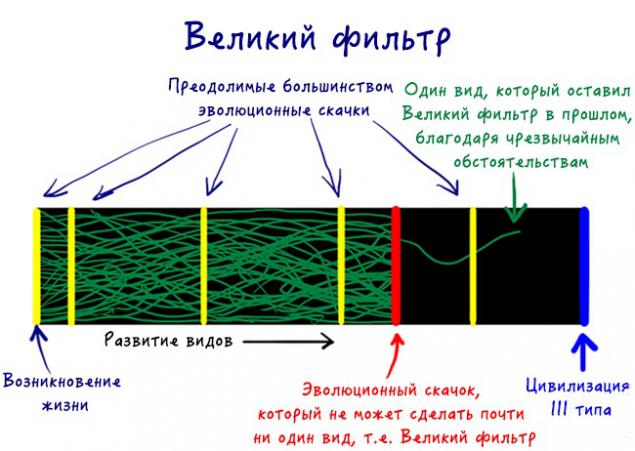
If so, the big question is: where on the timeline is the Great Filter? This is a fundamental question for humanity: Based on the answers, we have three ways to self-determination - we are unique, we are the first, or we cover. We are unique (behind the Great Filter) The hope is that we have left behind the Great Filter - we managed to survive it and even get to our current level of intelligence - probably explains why there is a type III civilization. But if we are special, what exactly has made us so - that is what we were able to overcome than others to get stuck? One option: Great Filter could be at the beginning - maybe it was he who laid the foundation of life on Earth. This is possible because the appearance of life took a billion years of the planet, and because all of our attempts to somehow restore this event in the laboratory have been unsuccessful. If all the matter in the Grand filter, it means that another life is possible in principle. Another option: The Great Filter - a leap from the simple to the complex prokarioticheskory eukaryotic cells. After the appearance of prokaryotes it took 2 billion years to find the kernel and become complicated. If this is the Great Filter, then the universe is teeming with prokaryotes, and nothing else there. There are other assumptions - for example, some believe the Great Filter is our leap from semi-intelligent life (chimpanzees) to reasonable (people). If we really are so special, it can be not only a consequence of exceptional biological events, but also what is called "Rare Earth hypothesis." It says that if there are other planets similar to Earth, only to have some of our conditions favorable for life.
We are the first
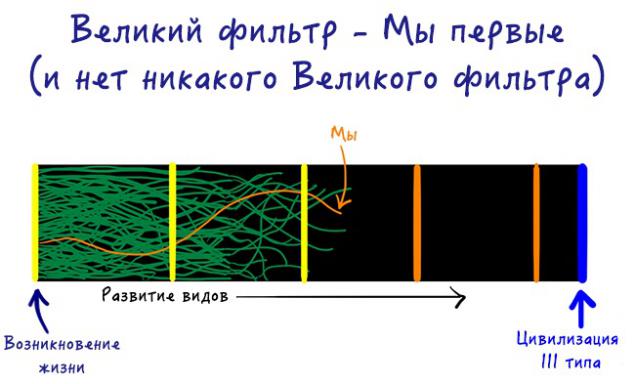
For the first group of thinkers, if not the Great Filter is behind us, then we have hope that the conditions in the universe only recently since the time of the Big Bang have reached the level that would allow intelligent life to evolve. In this case, we have many other kinds are on the way to a super-intelligence, and no one has simply not reached him. We are here at the right time to become one of the super-civilizations.
We cover (filter in front of the Great)
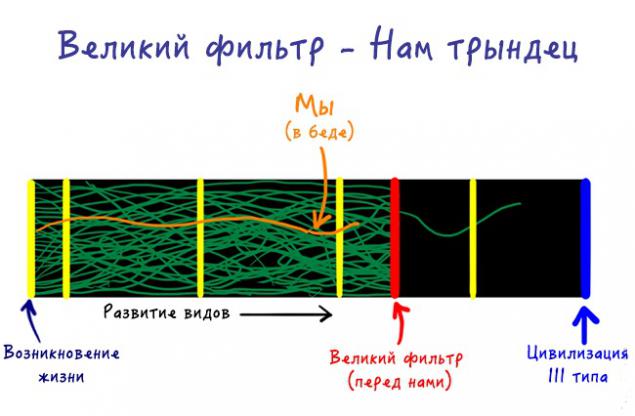
If we are not unique, and not the first, the scientists of the group concluded that the Great Filter is waiting for us in the future. This means that life is regularly evolving to the point where we are, and then something prevents the development of higher intelligence - and we will not be the exception. One of the possible future of the Great Filter - regularly occurring natural event, such as gamma-ray bursts, which can suddenly and in a moment destroy life on Earth. Another candidate for filters - the inevitability that almost all intelligent civilizations destroy themselves when a certain technological level. That's why the University of Oxford philosopher Nick Bostrom says that "no news - good news already." The discovery of the simplest life on Mars would be disastrous, as a number of potential carve the Great Filter is behind us, and accordingly, predrechet presence of one of them is straight ahead.
2. The higher civilization exist, but we do not know about them for a number of reasons, this group of scientists deny any allegations about our uniqueness, and, by contrast, adheres to the principle of mediocrity. He says that there is nothing unusual in our galaxy, the solar system, the planet or level of development, until the contrary is proved. They also suggested that the absence of signals from the higher forms of life does not prove that they do not exist - at least in view of the fact that we are able to receive signals only from a distance of about 100 light-years (about 0, 1% of the galaxy).
And here's 10 reasons why we may not know about the brothers on reason:
1. The supramental life could visit the earth, but before we arrived. Maybe we were - but at an early stage of development. Written history goes back only to the year 5500 - a group of ancient hunter-gatherers could get a memorable experience of contact with extraterrestrial races, but they did not know how to tell posterity.
2. Galaxy long ago colonized, but we live in a universe wilderness. The Americas were colonized by Europeans long before it realized a small tribe of Inuit in the far northern Canada. Perhaps for the higher species simply impractical and aimlessly to settle the part of the galaxy in which we live.
3. The concept of colonization is ridiculously unacceptable for higher species. Even the civilization of Type II with all the energy of its star could create for themselves an ideal environment that would meet all of its needs. She just nowhere to leave their studies for a happy utopia cold, empty, undeveloped universe. Even more advanced civilization may review the entire physical world as primitive terrible place to overcome their own biology and download your brain into a virtual reality, the eternal heavenly life. Frankly, thinking about the form of life that has befallen so immortality, I'm insanely jealous of her.
4. There are terrible predators civilization, and more reasonable peace-loving species simply prefer to keep a low profile and did not file any sign of life. This unpleasant guess explains why we do not receive any signals. This means also that incredibly naive and risky on our part to try to take them and respond to them. Now there is debate about whether we should send signals for extraterrestrial life, and most people say that it is useless. Stephen Hawking warns us that "the visit of the aliens would have to have the same effect as the landing of Columbus in the Americas for Native Americans».
5.Est only one instance of the higher forms of life - civilization "superhischnikov" (as the people here on Earth) - they destroy everyone who has reached a certain level of development. This is unfortunate and could work as follows. They did not exterminate all reasonable shape because many will die by themselves. But if some civilization reaches a certain point, she will be able to overcome the spread and grow like a virus, then make your move superhuman. Whoever was the first intelligent species in the galaxy, and now simply does not leave anyone else a chance.
6. Around full of every kind of activity and noise, but our technology is too primitive, and we hear not. If you are logged into a modern office building and tried to catch the signals on the radio, you would not have heard and decided that the building is empty, while hundreds of employees to communicate text messages. Or perhaps, as noted by Carl Sagan, our mind is faster or slower than other species: for example, they need 12 years to say "Hi" and we perceive it as white noise.
7. We have contact with other intelligent life, but the government is hiding. This idiotic theory, but I had to mention it because a lot of talk about it.
8. Higher civilization knows about us and watching us ("zoo theory"). Perhaps superintelligent civilizations exist in highly regulated galaxy, and our Earth is seen as part of a vast and protected national park with strict rules "Look but do not touch" to other planets like ours. We would not have noticed them, because the more advanced species would know a way to watch us without informing us know. Perhaps there is some rule like "Prime Directive" from "Star Trek," which prohibits the more developed forms to communicate with the less developed until they reach a certain intellectual level.
9. Higher civilization here, around us. But we are too primitive to see them. Michio Kaku puts it this way: "Let's say, in the woods is an anthill. And right next to it lay a ten superhighway. And that is the question: whether the ants realize that it? Will they understand the technology and the intention of the creatures who built it? "So we are not only able to receive signals from the planet X, using our technology, we can not even notice that they are doing all around us. It is so far from us that they want to enlighten us, it would be like that ants use the Internet to learn.
10. We are completely mistaken in our view of reality. The universe may in fact prove to be something of a hologram. Or perhaps we are the aliens landed here as an experiment or as fertilizer. There is even a suggestion that we all - a computer simulation of the researchers from another world, and other forms of life simply are not programmed this simulation.
As long as we continue our quest - perhaps futile - for extraterrestrial intelligence, I'm not sure I want to know the truth. To tell the truth, and the official recognition of our loneliness, and the need to join someone else equally terrible. All these surreal scenarios described above, baffle. In addition to its shocking sci-fi component Fermi Paradox gave me a deep humility. Not just the usual "Oh, yes, I'm a grain of sand, and my life lasts 3 seconds", which usually causes the universe. It's edgier, more personal humility. Studying all these crazy theories best scientists of our time, I thought that the next generation will look at us the same way as we now look at the ancient people, and say, "Oh wow, they generally had no idea that It is really going on! »
Source
All people have mixed feelings when a clear night gaze at the starry sky and see it ...
6 photos.

Some traditionally affected epic beauty and grandeur of the cosmos, I personally fall into a state of existential crisis. But the physicist Enrico Fermi wondered, "Where is the rest of intelligent life forms?" The starry sky seems overwhelmingly huge, but in fact we can only consider the immediate vicinity. The best night we can see about 2,500 stars (out of about 100 Millard in our galaxy), and almost all of them are from us at a distance of less than 1,000 light-years before us (about 1% of the diameter of the Milky Way). So we look at it:

Everything in the universe around 10²² stars, that is, for every grain of sand in the world, there 10,000 stars. And if we perform some simple calculations, you find that only one in our galaxy must be about 100 000 intelligent civilizations. The scientific world is not fully concurs about what percentage among those stars "sunlike" (similar in size, temperature, and the ability to shine) - estimates range from 5% to 20%. The most conservative estimate it gives us 500 trillion (or 500 billion billion) stars similar to the sun. Also argue about what percentage of these sunlike stars may have orbiting planets similar to Earth (with similar temperature conditions, water in the liquid state and the ability to support life). Some say that there are about 50%, but let's stick to more conservative 22%. This means that potentially inhabited planets like ours, only about 1% of all the stars of the universe, that is about 100 trillion planets. That is, for every grain of sand in the world there are about 100 Earth-like planets. Think about this the next time will be selected to the beach. Next, we have to make some assumptions. Let's imagine that in billions of years of its existence on 1% of the terrestrial planets evolved life (if that's true, every grain of sand will be a planet with life on it). And imagine that 1% of these planets have life reached a certain intellectual level - as we do on Earth. That would mean 10 quadrillion, or 10 million billion of intelligent civilizations in the observable universe. Now back to our galaxy alone. We perform the same conservative estimates: 100 billion stars of the Milky Way may be one billion Earth-like planets and 100 000 intelligent civilizations in our galaxy. If this is the case, and at least some of them sends radio waves or laser beams or some other signals for contact with others, they already could detect, for example, the Organization of the search for extraterrestrial intelligence (SETI). But there was no signal. No one. Never. It is even more strange: our Sun is relatively young by the standards of the universe. There are much older stars with a much older Earth-like planets, which in theory is the presence of more advanced civilizations. For example, compare our Earth (4, 5 billion years) and hypothetical planet X (8 billion years old).

Technology and knowledge are ahead of us for 1000 years, we have been shocked as well as medieval man modern life. Civilization, bypassed us in a million years would have been inconceivable for us as human culture for chimpanzees. But Planet X in front of us at 3, 5 billion years. There is such a thing - the scale Kardashev. It distinguishes civilization I, II, III types depending on their level of development. We have barely before I type. If the higher forms of existence, they do not notice it would be very difficult.
Where is everybody?
Welcome to the Fermi Paradox. All the hypothetical solution of this paradox can be divided into 2 groups: 1. There is no sign of higher civilization, because of higher civilizations do not exist for this group of scientists likely cause of the lack of other life forms is the so-called "Great Filter". The theory of the Great Filter says that at some point in their lives, anticipating the Civilization III type of life is faced with a kind of "wall" that hinders the evolutionary process or even cease to exist. It was she who is the greatest Filter.

If so, the big question is: where on the timeline is the Great Filter? This is a fundamental question for humanity: Based on the answers, we have three ways to self-determination - we are unique, we are the first, or we cover. We are unique (behind the Great Filter) The hope is that we have left behind the Great Filter - we managed to survive it and even get to our current level of intelligence - probably explains why there is a type III civilization. But if we are special, what exactly has made us so - that is what we were able to overcome than others to get stuck? One option: Great Filter could be at the beginning - maybe it was he who laid the foundation of life on Earth. This is possible because the appearance of life took a billion years of the planet, and because all of our attempts to somehow restore this event in the laboratory have been unsuccessful. If all the matter in the Grand filter, it means that another life is possible in principle. Another option: The Great Filter - a leap from the simple to the complex prokarioticheskory eukaryotic cells. After the appearance of prokaryotes it took 2 billion years to find the kernel and become complicated. If this is the Great Filter, then the universe is teeming with prokaryotes, and nothing else there. There are other assumptions - for example, some believe the Great Filter is our leap from semi-intelligent life (chimpanzees) to reasonable (people). If we really are so special, it can be not only a consequence of exceptional biological events, but also what is called "Rare Earth hypothesis." It says that if there are other planets similar to Earth, only to have some of our conditions favorable for life.
We are the first

For the first group of thinkers, if not the Great Filter is behind us, then we have hope that the conditions in the universe only recently since the time of the Big Bang have reached the level that would allow intelligent life to evolve. In this case, we have many other kinds are on the way to a super-intelligence, and no one has simply not reached him. We are here at the right time to become one of the super-civilizations.
We cover (filter in front of the Great)

If we are not unique, and not the first, the scientists of the group concluded that the Great Filter is waiting for us in the future. This means that life is regularly evolving to the point where we are, and then something prevents the development of higher intelligence - and we will not be the exception. One of the possible future of the Great Filter - regularly occurring natural event, such as gamma-ray bursts, which can suddenly and in a moment destroy life on Earth. Another candidate for filters - the inevitability that almost all intelligent civilizations destroy themselves when a certain technological level. That's why the University of Oxford philosopher Nick Bostrom says that "no news - good news already." The discovery of the simplest life on Mars would be disastrous, as a number of potential carve the Great Filter is behind us, and accordingly, predrechet presence of one of them is straight ahead.
2. The higher civilization exist, but we do not know about them for a number of reasons, this group of scientists deny any allegations about our uniqueness, and, by contrast, adheres to the principle of mediocrity. He says that there is nothing unusual in our galaxy, the solar system, the planet or level of development, until the contrary is proved. They also suggested that the absence of signals from the higher forms of life does not prove that they do not exist - at least in view of the fact that we are able to receive signals only from a distance of about 100 light-years (about 0, 1% of the galaxy).
And here's 10 reasons why we may not know about the brothers on reason:
1. The supramental life could visit the earth, but before we arrived. Maybe we were - but at an early stage of development. Written history goes back only to the year 5500 - a group of ancient hunter-gatherers could get a memorable experience of contact with extraterrestrial races, but they did not know how to tell posterity.
2. Galaxy long ago colonized, but we live in a universe wilderness. The Americas were colonized by Europeans long before it realized a small tribe of Inuit in the far northern Canada. Perhaps for the higher species simply impractical and aimlessly to settle the part of the galaxy in which we live.
3. The concept of colonization is ridiculously unacceptable for higher species. Even the civilization of Type II with all the energy of its star could create for themselves an ideal environment that would meet all of its needs. She just nowhere to leave their studies for a happy utopia cold, empty, undeveloped universe. Even more advanced civilization may review the entire physical world as primitive terrible place to overcome their own biology and download your brain into a virtual reality, the eternal heavenly life. Frankly, thinking about the form of life that has befallen so immortality, I'm insanely jealous of her.
4. There are terrible predators civilization, and more reasonable peace-loving species simply prefer to keep a low profile and did not file any sign of life. This unpleasant guess explains why we do not receive any signals. This means also that incredibly naive and risky on our part to try to take them and respond to them. Now there is debate about whether we should send signals for extraterrestrial life, and most people say that it is useless. Stephen Hawking warns us that "the visit of the aliens would have to have the same effect as the landing of Columbus in the Americas for Native Americans».
5.Est only one instance of the higher forms of life - civilization "superhischnikov" (as the people here on Earth) - they destroy everyone who has reached a certain level of development. This is unfortunate and could work as follows. They did not exterminate all reasonable shape because many will die by themselves. But if some civilization reaches a certain point, she will be able to overcome the spread and grow like a virus, then make your move superhuman. Whoever was the first intelligent species in the galaxy, and now simply does not leave anyone else a chance.
6. Around full of every kind of activity and noise, but our technology is too primitive, and we hear not. If you are logged into a modern office building and tried to catch the signals on the radio, you would not have heard and decided that the building is empty, while hundreds of employees to communicate text messages. Or perhaps, as noted by Carl Sagan, our mind is faster or slower than other species: for example, they need 12 years to say "Hi" and we perceive it as white noise.
7. We have contact with other intelligent life, but the government is hiding. This idiotic theory, but I had to mention it because a lot of talk about it.
8. Higher civilization knows about us and watching us ("zoo theory"). Perhaps superintelligent civilizations exist in highly regulated galaxy, and our Earth is seen as part of a vast and protected national park with strict rules "Look but do not touch" to other planets like ours. We would not have noticed them, because the more advanced species would know a way to watch us without informing us know. Perhaps there is some rule like "Prime Directive" from "Star Trek," which prohibits the more developed forms to communicate with the less developed until they reach a certain intellectual level.
9. Higher civilization here, around us. But we are too primitive to see them. Michio Kaku puts it this way: "Let's say, in the woods is an anthill. And right next to it lay a ten superhighway. And that is the question: whether the ants realize that it? Will they understand the technology and the intention of the creatures who built it? "So we are not only able to receive signals from the planet X, using our technology, we can not even notice that they are doing all around us. It is so far from us that they want to enlighten us, it would be like that ants use the Internet to learn.
10. We are completely mistaken in our view of reality. The universe may in fact prove to be something of a hologram. Or perhaps we are the aliens landed here as an experiment or as fertilizer. There is even a suggestion that we all - a computer simulation of the researchers from another world, and other forms of life simply are not programmed this simulation.
As long as we continue our quest - perhaps futile - for extraterrestrial intelligence, I'm not sure I want to know the truth. To tell the truth, and the official recognition of our loneliness, and the need to join someone else equally terrible. All these surreal scenarios described above, baffle. In addition to its shocking sci-fi component Fermi Paradox gave me a deep humility. Not just the usual "Oh, yes, I'm a grain of sand, and my life lasts 3 seconds", which usually causes the universe. It's edgier, more personal humility. Studying all these crazy theories best scientists of our time, I thought that the next generation will look at us the same way as we now look at the ancient people, and say, "Oh wow, they generally had no idea that It is really going on! »
Source
